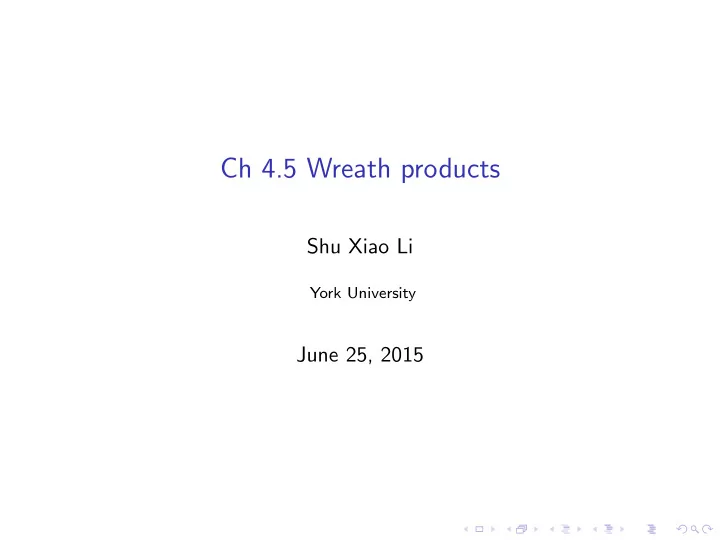

Ch 4.5 Wreath products Shu Xiao Li York University June 25, 2015
Consider finite group Γ, and PSH A ( S n [Γ]) with basis irreducible characters. Let Irr(Γ) = ( ρ 1 , . . . , ρ d ) be irreducible representations of Γ, and χ λ be irreducible representations of S n , indexed by partitions λ in Par n . Define a representation χ λ,ρ of S n [Γ] such that σ ∈ S n , γ ∈ Γ n acts on χ λ ⊗ ( ρ ⊗ n ) as σ ( u ⊗ ( v 1 ⊗ · · · ⊗ v n )) = σ ( u ) ⊗ ( v σ − 1 (1) ⊗ · · · ⊗ v σ − 1 ( n ) ) γ ( u ⊗ ( v 1 ⊗ · · · ⊗ v n )) = u ⊗ ( γ 1 v 1 ⊗ · · · γ n v n ) .
Theorem 4.36 The irreducible C S n [Γ]-modules are induced characters � � χ λ (1) ,ρ 1 ⊗···⊗ χ λ ( d ) ,ρ d χ λ = Ind S n [Γ] S deg ( λ ) [Γ] as λ runs through all functions λ : Irr (Γ) → Par ρ i �→ λ ( i ) . with � d i =1 | λ ( i ) | = n . Furthermore, one has a PSH-isomorphism A ( S [Γ]) → Λ ⊗ d χ λ �→ s λ (1) ⊗ · · · ⊗ s λ ( d ) .
Theorem 3.12 tells A ( S [Γ]) ∼ = ⊗ ρ ∈C A ( S [Γ])( ρ ) where C is the primitive elements in Σ and A ( ρ ) ⊂ A is the Z -span of Σ( ρ ) = { σ ∈ Σ | there exists n ≥ 0 with ( σ, ρ n ) � = 0 } . From the definition of coproduct, it is clear that ρ ∈ Irr( S n [Γ]) is primitive if and only if n = 1 i.e. ρ ∈ Irr(Γ) = { ρ 1 , . . . , ρ d } .
From i) and ii), we obtain Φ : R ( S n ) → R ( S n [Γ]) and Ψ : R ( S n [Γ]) → R ( S n ) such that Φ( χ ) = χ ⊗ ( ρ ⊗ n ) and Ψ( α ) = Hom C Γ n ( ρ ⊗ n , α ). From iii), iv), and self-duality, we could prove Φ , Ψ are PSH-morphisms, Ψ ◦ Φ = id and Im (Φ) = R ( S n [Γ])( ρ ). Therefore, taking direct sum of all n ≥ 0, we obtain an isomorphism between A ( S [Γ])( ρ ) and A ( S ), which is isomorphic to Λ.
The End
Recommend
More recommend